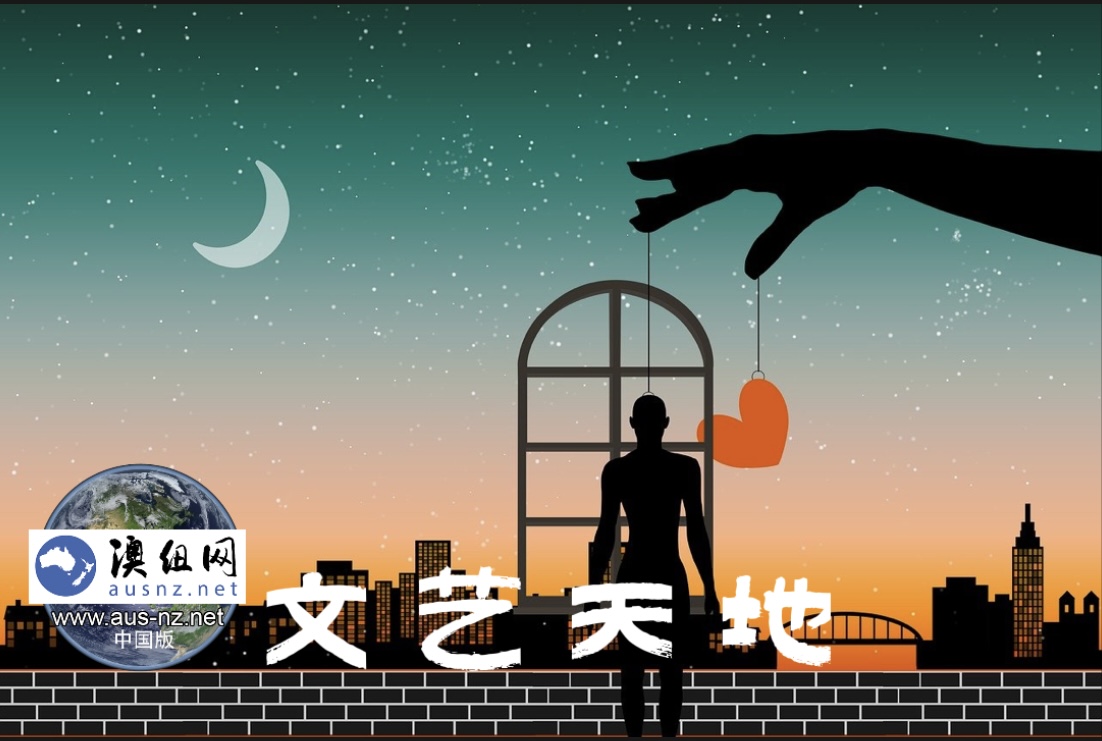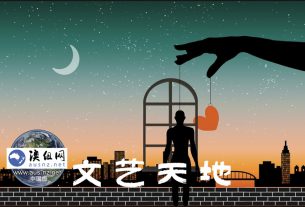The Premiere Of Cao Shui’s Turkish Poetry Collection Was Successfully Held In Istanbul
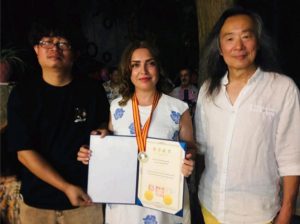
On August 3, Cao Shui’s poetry collection in Turkish “Listening to the Heartbeat of the World in Istanbul” was launched in Istanbul, Turkiye. The inaugural ceremony was held at the Hygiene Munich Gallery in Istanbul, presided over by the translator of the book and the famous Turkish poet Nurduran Duman. Cao Shui delivered the speech “From China to Rome, We Must Pass Through Istanbul”. Cao Shui recited his five poems on the scene, answered readers’ questions, and finally held a signing meeting. The inaugural ceremony was held successfully. At the inaugural ceremony, there was also an award ceremony for the Great Poetry Movement Medal, and the Chinese Poetry Night: Yang Lian and Cao Who Poetry Recitation, which was the prelude to the 22nd Homer International Poetry Festival.
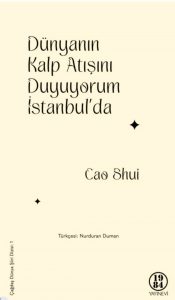
This collection of poems selects dozens of short poems by Cao Shui, which were translated by Nurduran Duman, a famous Turkish poet and translator, and published by 1984 Publishing House, Türkiye. The beautiful translations and exquisite designs are distributed throughout Türkiye. Nurduran commented on Cao Shui’s poetry: “Words are the power itself, which can change people’s thoughts, feelings, and behavior. The silence hidden between words holds the most mysterious power in our universe. This means that poetry has the power to change the world, which is also the opportunity for us to create world peace. From the name of Cao Shui’s poetry collection, we can see that he has taken on such a mission.” The Great Dance of Sorrow ” has so many translations in different languages, which clearly demonstrates Cao Shui’s poetic pursuit.
Cao Shui’s poetry has been translated into more than 20 languages and has received praise from Chinese and foreign poets. 32 famous poets have written comments on this book. Fernando Rendon, the great Colombian poet, director of the Medellin Poetry Festival, and general coordinator of the World Poetry Movement, commented: Cao Shui has developed an important and vast body of work. His poetry serenely observes humanity, in the vigil between worlds, next to the frontier of eternity. The myths of all times and all places, which reality has taken away from us, come together again in his verses. The birds circle around his vision. The living stone sings forever: “While you live, shine! / Have no grief at all! / Life exists only for a short while / and time demands its due! /”. The fire of love and the glacier of hate fight each other, but the endearing flames of the beginning of life always prevail. The ice melts and spring returns. Awaken the dream in which we know everything. The bridge between Heaven and Earth has been opened by the ancestors, Cao Shui, and you too make us see an ancient and new bridge between East and West. We are made of the ancestors and their knowledge. And of the deep dream of the future. In your lines we cross both bridges.
Qiu Huadong, Chinese poet and writer, Secretary of the Secretariat of the China Writers Association, comments: Cao Shui has been pursuing the spirit of “Great Poetry”, which is a process of continuous exploration. His poetry can be divided into three stages. In Cold Lyric, we can read the “Lyric order” originated in the youth; In the Epic of Eurasia, he tries to integrate many ancient civilizations in Asia and Europe and reconstruct a Utopian “Human Community”; In the Flowers of Empire published in Italy, we can see Cao Shui’s feeling about the modern transformation of Chinese civilization after he came to Beijing from the west China. He found the position of Chinese civilization in comparison with modern world civilization, which is a crack to western centralism. He hopes to construct “the Flower of the Empire” with multiple civilizations as petals. Of course, the Empire here is the emperor’s original meaning “flower pedicle” , it can be said that it is still the embodiment of the “lyrical order” he initially pursued, and it is also the embodiment of the “human community”. On the road of exploring “Great Poetry”, Cao Shui extracted elements from various civilizations and finally deconstructed them into a new order. This latest collection of poems interprets the form in the modern transformation of Chinese civilization, and creates a attractive and atmospheric world with the unbridled language as always.
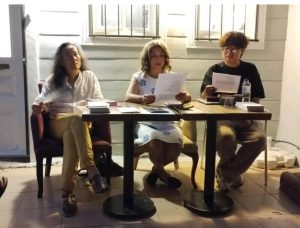
Cao Shui delivered a speech at the inaugural ceremony titled ‘From China to Rome, we must pass through Istanbul’, and he explained the significance of Istanbul for the exchange of Eastern and Western civilizations, “I have dreamed many times that I would ride a horse from China, follow the Silk Road, and arrive in Rome, passing through Istanbul in the middle. Now my dream has become a reality, and at this moment I am stepping on the land of Istanbul, between Asia in the East and Europa in the West. He is the gate of Eastern and Western civilization. The person who led me through the gate is Nurduran Duman . We met at the first international writing program of the Chinese Writers Association in 2017 and have been communicating in Beijing for over half a year. We often discussed literature with poets from around the world in restaurants, and the republic of world literature has been established on the dining table.”
Cao Shui narrated his journey of initiating the Great Poetic Movement and participating in the World Poetry Movement, and recited the poem “Listening to the World’s Heartbeat in Istanbul” specially written for Istanbul.
In the dark night sky
We are waiting for the world to wake up
At this moment, I heard heartbeat of Istanbul
The sound of heartbeat spreads from the center of the world
Illuminate the starry sky in Eurafrasia one by one
From Istanbul
Eastward to Persia, India, China
Westward to Greece, Rome, England
Southward to Canaan, Egypt, Ethiopia
We land on the top of the sophisticated Hagia Sophia
Watching the three-colored clover spiral wildly
The three-headed lion roars towards Cairo with meaning
The three-headed eagle flies with towards Rome its sound
The three-headed horse runs towards Chang’an with image
We sigh under the starry sky at the top of Hagia Sophia
No ancient person has shed fewer tears than modern people
No ancient person had more joy than modern people
No eastener has less wisdom than westerner
No westerner has more kindness than eastener
We witness at the center of the world
Incarnation in Jerusalem
Reincarnation in Bodhgaya
The world wakes up again from the silence of humanity
Finally, Cao Shui looked forward to his pursuit of world literature: “When I was a child, my second brother Cao Chunbo once gave me a painted version of the Bible The story of the Tower of Babel mentioned above is unforgettable to me for a long time. Humans want to build a Tower of Babel that leads to heaven, gathering from all over the world. God, afraid of violating his own authority, has disrupted human language. People cannot build the Tower of Heaven because they cannot communicate, thus forming two thousand ethnic groups around the world. Although it is a punishment to human beings from the perspective of God, I had a dream when I was young, that is, to build the Tower of Babel in culture so that brothers and sisters from all over the world can communicate freely. I think one of the ways is translation. Since Goethe proposed the concept of world literature in 1827, world literature has become the dream of many excellent writers. I also hope to work with all writers who share a common dream through my own creation in the future to establish a common tower of world literature for mankind.”
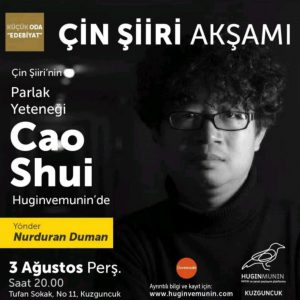
Cao Shui is one of the representative poets of the post-80s generation in China. In recent years, he has participated in a series of international activities, such as the Medellin International Poetry Festival, the Krisya International Poetry Festival in India, the Havana International Poetry Festival in Cuba, and the International Writing Plan of the China Writers Association. His works have been translated into more than 30 languages, including English, French, Russian, Indian, Polish, Danish, Italian, Spanish, and Turkish, etc. There are more than 30 famous poets writing comments in the international poetry world, renowned as a representative poet of the “young generation leading the new world” by the outstanding Indian poet Ratti Saxena. He also translated three books, including “The Song of the Dreamland”. He is a poet with international reputation and is known as the “International Cao” in the poetry world. He writes poetry, novels, fairy tales, as well as film and TV series scripts. He has published more than 40 books, including poetry collections such as “The Epic of the Eurasian Continent”, novels such as “The Secret History of Kunlun”, literature collections such as “The Animal Kingdom of Kekexili”, fairy tales such as “The Princess Snow Leopard”and created over 100 film and television scripts such as “The Peacock King”. He also founded the Great Poetry School, initiated the “Cao-Yi Controversy” in the literary world, advocated for the DramatizeNovel Movement, and the Film Poetry Movement, which had a wide influence in the literary world. In recent years, Cao Shui has won more than 50 literary and artistic awards at home and abroad, including the First Chinese Young Poet Award, the 7th Chinese Long Poetry Award, the “Literary Star” of the 5th Qinghai Youth Literature Award, the 4th Cao Yu Cup Script Award, the Apolo Dionysus Poetry Award of the 8th Rome Contemporary International Academy of Poetry and Art Award, and the 2021 Russian Golden Knight Award. His works have gained dual recognition from the literary world and the market. He is considered one of the representative writers of the post-80s generation in China.
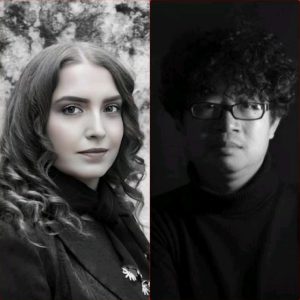
Nurduran Duman is a Turkish poet, translator and playwright who lives in Istanbul. She is the coordinator of World Poetry Movement of Europe. Pursuing her passion for the sea, received a degree as an Ocean Engineer and Naval Architect from Istanbul Technical University. And she’s a columnist in one of the most prestigious newspaper of Turkiye, Cumhuriyet. Her books include Yenilgi Oyunu, the 2005 Cemal Sureya Poetry Award winner, and Mi Bemol. Semi Circle, a chapbook of her poems translated into English, was published in the United States in 2016 and further English translations can be found in Asymptote, Colorado Review, Kenyon Review, Faultline, Modern Poetry in Translation (MPT) and others. Her books of “Selected Poems” (Versopolis, 2017, Macedonian-English-Turkish) in Macedonia, “Selected Poems” (Versopolis, 2019, Dutch-English-Turkish) in Belgium. Her poetry collection “Steps of Istanbul” (Herald Publisher Proprieraty, 2019, Chinese-English-Turkish) was published in China in November 2019, and was awarded as “The Poetry Collection of the Year of the Second Boao International Poetry Award”. Her poem “The River” was published in Modern Poetry in Translation (MPT) in 2017 in the UK. She featured in the #internationalwomensday2018 (#IWD18) MPT list of ten women poets in translation from all over the World. The poem “act” for Alexandre Hollan’s painting, she wrote upon request of Paul Valéry Museum in France, was published in the book of museum “Peinture et Poésie (Painting and Poetry)”. Her poems also have been translated into Finnish, Chinese, Spanish, Azerbaijan Turkish, Bulgarian, Romanian, Slovak, French, German, Occitan, Macedonian, and Italian. She is a poet included in the European poetry platform, Versopolis. Duman was elected as a board member of the Writers Syndicate of Turkiye and is an active member of Turkish PEN.
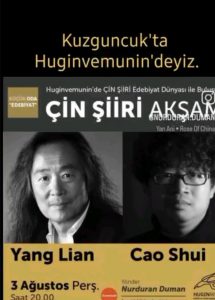
On the evening of the same day, there was also a recitation of “Chinese Poetry Night: Yang Lian and Cao Who”, where the representative poet of the Hazy Poetry, Yang Lian, and the representative poet of the new generation of China, Cao Shui, respectively recited their own works. They answered readers’ questions about whether poetry can be translated. Cao Shui answered, “Poetry is composed of meaning and form. If we compare meaning to the human body, form is clothing, and people can understand each other by changing clothes in different languages.” Cao also summarized the exchange of Eastern and Western civilizations, Compared to the entire history of civilization, the era is fleeting. We need to grasp the development of the entire historical trend, and ultimately integrate various civilizations to form a brand new human civilization.
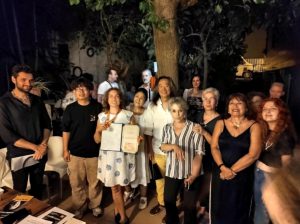
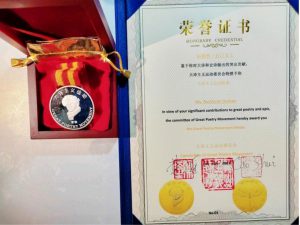
After the inaugural ceremony, there was a ceremony for the Great Poetry Movement Medal. Due to the outstanding contributions of Nurduran Duman to the great poetry and epic, Cao Shui, on behalf of the Greatry Poetry Movement Committee, presented her with the first Great Poetry Movement Medal. Yang Lian and Cao Shui presented the medal and certificate to her on site.The Great Poetry Medal is made of pure silver, with a diameter of 70mm, a thickness of 3.4mm, a weight of 70g, and made in Yongxing, the silver capital of China. From design to casting, it was created by famous artists. The portrait was taken by the famous photographer Song Zuifa, the medal was designed by the famous sculptor Zhang Guoliang, and the seal was carved by the famous calligrapher Gu Mingchuan; On the front is a portrait of Cao Shui, the initiator of the Great Poetry Movement, written in both Chinese and English: GREAT POETRY MOVEMENT; On the back is an ancient map of Asia, Europe, and Africa in clover’s shape, annotated with ASIA, EUROPE, and AFRICA in English. The map was drawn by German geographer Heinrich B ü ting in 1581 and represents the known ancient world at that time. Here, it symbolizes the common home of humanity, and the core idea of the Great Poetic Movement is carved around it, which is “integrating ancient and modern cultures, integrating Western and Eastern cultures, integrating sacred and secular cultures”. The Great Poetry Movement began in 2007 when Cao Shui wrote the “Manifesto of the Great Poetry Movement” and has now spread to major languages around the world. Starting from this year, the Committee of the Great Poetic Movement will select two international poets who have made outstanding contributions to great poetry and epic each year, and Haluk was the second poet to receive the medal.
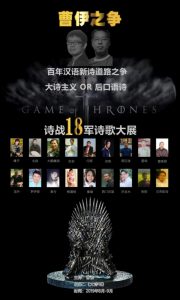
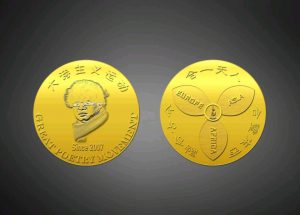
Great Poeticism or Great Poetry Movement is a poetic trend in the Chinese poetry world in the 21st century. Great poetry can be traced back to epic poetry. It was proposed by Chinese poet Hai Zi in the 1980s, and in 2007, poet Cao Shui wrote the “Manifesto of Great Poeticism” and jointly launched the Great Poetry Movement with poets such as Xi Yuan and Xi Di. They advocats the extraction of elements from various civilizations, integrating sacred and secular cultures, integrating Eastern and Western cultures, integrating ancient and modern cultures, to creat a brand new world of imagery. He founded the magazine “Grand Poetry-Literary Perspective”. Great Poetry Movement was listed as one of the 20 avant-garde poetic schools in China. In “Dancing on the Pen Tip: A Witness to the Literature of the 80s” (formerly known as “History of Literature of the 80s”) edited by Xu Duoyu, have been introduced in a special chapter in the “Literary Theory” volume. Along with Statism and Sensory Writing, they are known as the three major literary trends initiated by the post-80s Chinese writers. Representative poets include Zhuang Ling, Han Bing, Lei Xun, Shen Jia, Shen Xue, Ye Mo, Shu Xian, Ying Zi, Su Ming, Yue Jian, Peng Shujin, Yin Zixu, Xu Yanmu, Guo Liangzhong, Shan Yuyang, Nuobu Langjie and many other post-80s and post-90s poets. In 2018-2020, Cao Shui, who represented the “Great Poetry Movement” and Yi Sha’s “Post-Colloquial Poetry School”, engaged in a three-year debate, which was referred to as the “Cao-Yi Dispute” in the poetry world. In the first issue of “Literary Freedom Talk” in 2023, Cao Shui, who wrote an article titled “Cao-Yi Dispute and the Ten Major Disadvantages of the Chinese Literary World” in the form of a cover poet, summarized that the “Cao-Yi Dispute” erupted one hundred years after Hu Shi wrote the “Trial Collection”,which is the first poetry collection published in mordern Chinese, which was probably caused by a series of factors, At that time, many people interpreted it as the “debate over the century long path of Chinese new poetry”, believing it to be the biggest controversy in the Chinese poetry world since the “Panfeng Dspute”(The Debate between Intellectuals Poets and Folk Poets in Chinese History) and the “most modern controversy of the 21st century”. The core of this debate is the issue of the direction of Chinese new poetry, whether it is the “Post-Colloquial Poetry” advocated by Yi Sha, the “Great Poetry” advocated by Cao Shu. During this process, He was able to discern the various strange current situations in the literary world, and literature called for an in-depth “literary reform movement”. Since 2017, With Cao Shui joining the World Poetry Movement, it has been spread to various countries around the world.
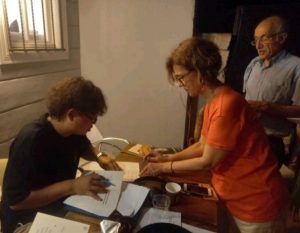
At the end of the inaugural ceremony, a signing meeting was held. Turkish poets and readers who were present asked Cao Shui to sign their names. They told Cao Shui that his reading “I Always See My Mother’s Appearance As A 12-Year-Old Girl” made them cry. Some readers suggested Cao He buy a Turkish dress for his mother. Chinese readers such as Yang Lian’s wife You You, and Zhu Yue, who was traveling in Istanbul, also attended the event. Afterwards, Cao Shui went to Bozcaada Island to participate in the 22nd Homer International Poetry Festival. Bozcaada Island is located in the Aegean Sea, just across from the ancient city of Troy, and was the place where the Greek coalition ambush when they implemented the Trojan Horse Plot. At this Homer Poetry Festival, poets from China will read Homer’s epic Iliad in Chinese for the first time, which was reported by many newspapers in Türkiye. (End)
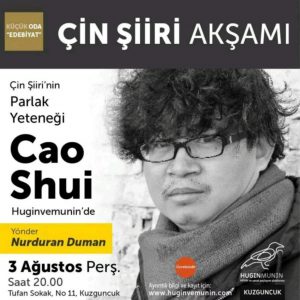
Biography of Cao Shui
Cao Shui(Chinese: 曹谁;pinyin: Cáo Shuí), also Shawn Cao (born in Jun 5, 1982), is a Chinese poet, novelist, screenwriter and translator. He is a representative figure of Chinese Contemporary Literature. He leads “the Greatpoeticism” movement. In his “Manifesto of Greatpoem”, he aims to integrate sacred and secular cultures, oriental and occidental cultures, ancient and modern cultures in Chinese literature. In 2008, he resigned from a newspaper and traveled around Tibet and Xinjiang, which is the center of Eurasia or the World in his view. His novels Secret of Heaven trilogy tells the whole developing history of human civilization. His most notable works includes Epic of Eurasia, the already mentioned trilogy and King Peacock (TV series). In his works, he extracts elements of various ancient human civilizations, from Babylon to the west to Judea, Egypt, Greece, to the east to Persia, India, China, and uses these elements to reconstruct a new Utopian human homeland, which always described as Eurasia, the Top of the Tower of Babel or Kunlun Mountains (Heaven Mountains). So far fourty books of Cao Shui have been published, including ten poem collections, four essay collections, ten novels, twenty fairy tales, four translations and one hundred episodes TV series and films. He has won more than 50 literary awards worldwide, including the 1st Chinese Young Poet Award, the 4th Cao Yu Cup Drama Award, the Apollo Dionysus Award of the 8th Italian Rome International Academy of Contemporary Poetry and Art Award, the 12th Russian Golden Knight Award, and the Top Ten Public Figures of the 5th Chinese Poetry Spring Festival Gala, etc.His works have been translated into English, Italian, Spanish, French, German, Swedish, Portuguese, Danish, Polish, Russian, Hungarian, Croatian, Slovenian, Turkish, Arabic, Japanese, Korean, Hindi, Nepali, Vietnamese, Tibetan, Mongolian, etc. He has been invited to participate in the 30th Medellin International Poetry Festival, the 26th Havana International Poetry Festival, the 14th Kritya International Poetry Festival in India and the 4th Qinghai Lake International Poetry Festival. He is a member of China Writers Association, China Film Association and China Poetry Society. He is also chief editor of Great Poetry, deputy editor in chief of World Poetry, secretary general of Boao International Poetry Festival and vice president of the Silk Road International Poetry Festival. Currently he lives in Beijing, and works as a professional writer and screenwriter.

![]()
新西兰 澳纽网出品
编辑:小图

广告 | Advertisement
在澳纽网做广告 | Advertise with us
779 views


